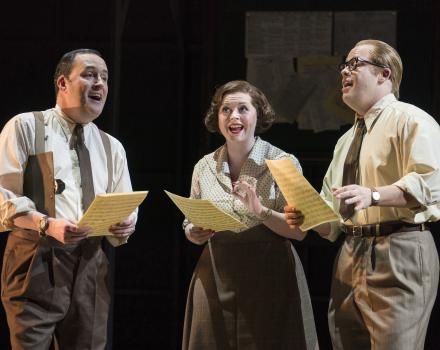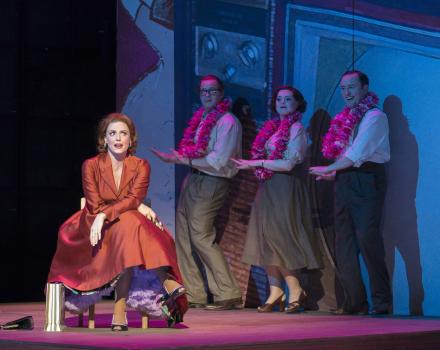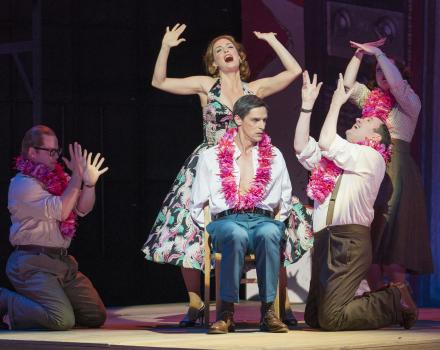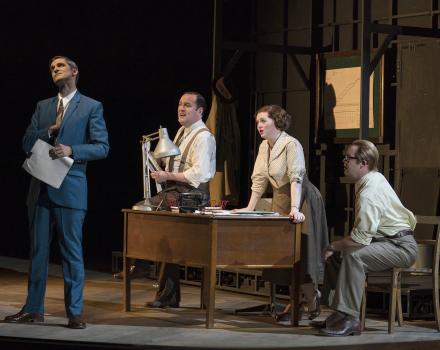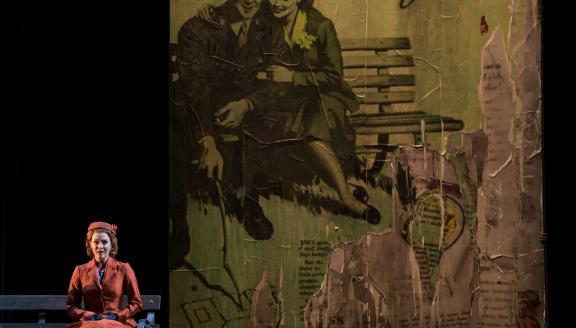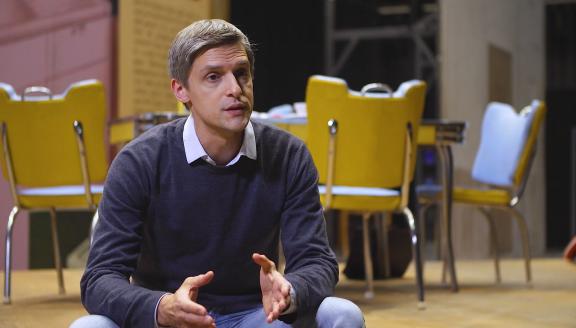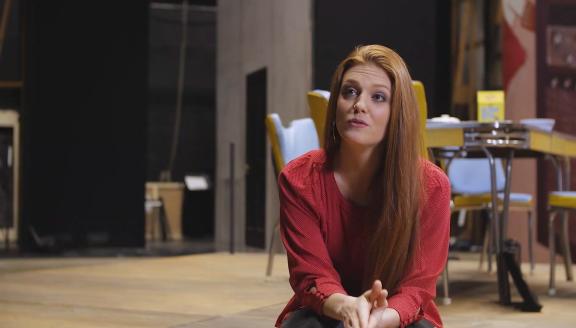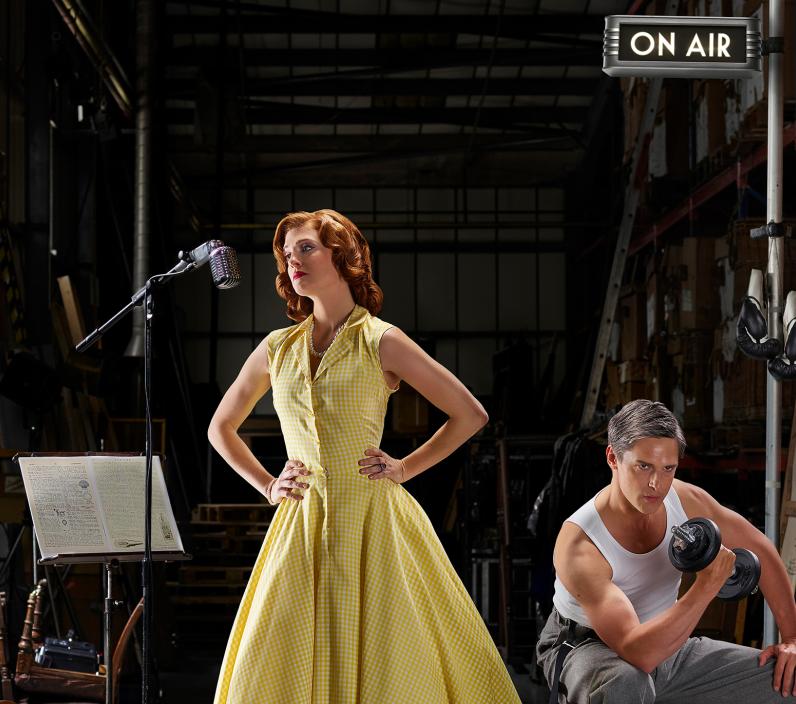

Trouble in Tahiti

A successful businessman and his wife lead a comfortable family life, but when it fails to meet their expectations they must find a way to save their marriage.
Matthew Eberhardt brings 1950s suburbia to life in Leonard Bernstein’s colourful criticism of American consumerism. This performance stars Wallis Giunta, winner of the Young Singer Award at the 2018 International Opera Awards, in the role of Dinah.
Cast
|
Sam
|
Quirijn de Lang
|
|---|---|
|
Dinah
|
Wallis Giunta
|
|
Trio
|
Fflur Wyn, Joseph Shovelton, Nicolas Butterfield
|
|
Junior
|
Charlie Southby
|
| ... | |
|
Music
|
Leonard Bernstein
|
|---|---|
|
Conductor
|
Tobias Ringborg
|
|
Director
|
Matthew Eberhardt
|
|
Sets
|
Charles Edwards and George Leigh
|
|
Lighting
|
Ben Pickersgill and Charles Edwards
|
|
Costumes
|
Hannah Clark
|
|
Text
|
Leonard Bernstein
|
| ... | |
Video
The story
In a radio studio, a jazz Trio sings of a dream life in Suburbia.
In their suburban home, a married couple, Sam and Dinah, argue over breakfast. Dinah accuses Sam of having an affair with his secretary, which he denies. She also reminds him that their son Junior is appearing in the school play that afternoon. Sam says that he can’t go to watch because he is playing in a crucial handball tournament at the gym.
At work, Sam deftly handles business by telephone and agrees to lend money to a friend. The Trio extols Sam’s virtues.
In her analyst’s office, Dinah recounts her dream of an untended garden, choked with weeds. In the dream, she hears a voice calling to her, describing another garden – a place of love and harmony. Meanwhile, at the office, Sam interrogates his secretary about his behaviour towards her.
By chance, Sam and Dinah run into each other on the street. Both invent excuses to avoid having lunch together. Alone, they each wonder where their relationship went wrong.
In an Interlude, the Trio extols family life in Suburbia.
At the gym, Sam has just won the handball tournament. He reflects triumphantly on the law of men – how they are created unequal: some try as they might lose, while others, like him, win.
Dinah has spent the afternoon at the cinema watching a South Sea romance called Trouble in Tahiti. At first she dismisses it as technicolor drivel. But as she recalls the film’s story and the theme song, ‘Island Magic’, she becomes lost in its escapist fantasy. Then she stops herself and prepares dinner.
As he arrives home, Sam reflects on another law of men – that even the winner must pay for what he gets.
The Trio sings of evenings of domestic bliss in Suburbia. Sam and Dinah try to talk about their relationship, but the effort quickly peters out. Neither of them has gone to Junior’s play. Sam suggests they go to a movie – something about Tahiti; ‘Why not?’, Dinah says. As they leave, they express a longing to reconnect with each other; but for now they settle for the ‘bought-and-paid-for magic’ of the movies.
Insights
5 things to know about Trouble in Tahiti
1° Composition, writing, musical direction...
Bernstein composed his first opera during his honeymoon. The musician of many talents wrote the libretto and music for Trouble in Tahiti and directed and conducted the premiere himself in June 1952 at the University of Brandeis, Massachusetts. Eager to make his one-act satirical opera seem as realistic as possible, Bernstein set it in the aftermath of World War II, a time when consumerism was spreading through society. His work had a number of autobiographical references and the male protagonist, Sam, shares his name with Bernstein’s father who left Russia to find the 'American Dream'.
2° A review of the American dream
The characters in Trouble in Tahiti face isolation as competition overtakes love as their central driving force. Sam works while Dinah stays at home in their tidy suburb. Sex between them is no longer desired as a source of pleasure. The couple cannot overcome their obstacles and have forgotten how to communicate.
3° A jazz vocal trio
The opera opens in an original way: with a jingle. This jingle is performed by a musical trio who sing into the microphone of a recording studio. Bernstein wanted this trio to ‘never stop smiling’. The jazz rhythms evoke the radio commercials of the time, such as the opening of ‘Morning sun’ below. Performed by a baritone, soprano and tenor, the trio is reminiscent of an ancient Greek choir that satirically comments on the story.
https://soundcloud.com/opera-north/sets/trouble-in-tahiti
These ‘jazz’ notes highlight the superficial happiness of the characters but the reality of their feelings becomes clear as the music changes for each setting: in the house the music is imbued with tension; it is introspective as Dinah describes her dream to her psychoanalyst in the aria ‘There is a garden’; and it becomes ironic in ‘Island Magic’, which deliberately parodies Rogers and Hammerstein's film South Pacific.
4° A production to celebrate the 100th anniversary of Bernstein’s birth
Leonard Bernstein was an eclectic composer and a leading figure in the musical composition of the twentieth century. He was also greatly admired as a pianist, conductor, author and teacher. His success as a composer lay in his ability to combine ‘serious’ music with the language of musical theatre, popular music, Latin American music and jazz. His enduring Broadway shows include New York, New York (1944) and one of the greatest stage hits of post-war America, West Side Story (1957). Bernstein also composed three symphonies: Jeremiah (1941-44), Age of Anxiety, (1947-49) and Kaddish (1961-63).
5° Opera North’s production
Matthew Eberhardt's production is set in the period that Bernstein intended. The walls and floors of the couple’s house are covered with advertising, and they live with the illusion that something’s coming, something good, if they can wait. From jingles in a radio studio to daydreams of Hollywood and Tahiti, the costumes are always faithful to the period.
The production is a critical success with The Times saying it’s 'too good to miss... Matthew Eberhardt's slick staging and Charles Edwards' designs match those jingles with big billboard advertisements.'
Gallery

